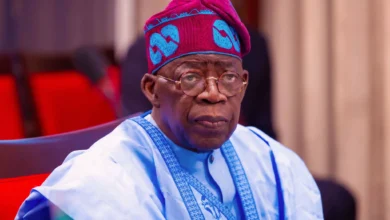DSS arrests leader of Mahmuda, major terrorist group operating in Kwara, Kogi

By Ologeh Joseph Chibu
The Department of State Services (DSS) has made significant inroad in dealing with terrorism..
The secret service has arrested Abubakar Abba, the leader of the Mahmuda terror group.
The group is responsible to a string of violence, kidnapping and killings in Kwara and Kogi States.
The group was linked to that sacking of villages in Kwara State in recent times.
Abba was arrested in his hideout in Niger State in a major breakthrough in the anti-terror campaign.
He has since been transferred to Abuja for further investigation.
Governor Mohammed Bago’s Chief Press Secretary, Bologi Ibrahim, said the development in a statement on Wednesday received by Irohinoodua was as a major milestone in the fight against terrorism.
“Yes, it is true. I can confirm that the leader of Mahmuda, which is one of the most dangerous terror groups in West Africa, Abubakar Abba, has been arrested by the DSS,” Ibrahim said. “He was apprehended alive through an intelligence-led operation. This is a huge victory for us as a people and as a government, and President Tinubu deserves commendation for this cheering news.”
Sources revealed that Abba was captured in Wawa, Borgu Local Government Area of Niger State.
The Mahmuda group, believed to be an offshoot of Boko Haram with links to the Islamic State, has been responsible for numerous deadly attacks in Niger and Kwara states. Its fighters, typically dressed in military camouflage and riding motorcycles, have been implicated in massacres, abductions, illegal mining, and extortion.
Recent atrocities attributed to the group include coordinated attacks in Kwara State on June 3, which claimed seven lives in two separate raids, and repeated assaults on markets and rural settlements near Kainji Lake National Park. In one such attack, 15 vigilantes were killed in Kemanji village.
Surge in Violent Attacks
Initial Violent Emergence in 2025
In April, Mahmuda militants shocked communities when they massacred over 15 vigilantes and villagers in Kemanji, Kwara State. Subsequent attacks in May–June left civilians dead and infrastructure destroyed—farmlands burned, bridges razed, and entire villages at the mercy of the militants. One particularly harrowing raid in mid-July resulted in seven villagers killed and several abducted—part of a terror campaign that displaced communities and deepened distrust in security structures.
Patterns of Violence
The militants’ hallmark tactics—attacks at night on isolated communities, targeting when vigilantes or troops are absent—have amplified their destructive impact. Their motorcycle-riding combatants, often clad in camouflage, have added to the terror factor. The group’s fluid movement within the forests enables rapid, hard-to-track assaults.
Operating from remote forest hideouts spanning Niger, Nasarawa, Kwara, and Kogi states, the group is regarded by security agencies as a persistent threat to the region.
While Mahmuda remains regionally concentrated, its emergence signals a worrisome evolution in Nigeria’s insurgency landscape: a localized terror group filling voids left by weakened governance in remote zones. Unlike Boko Haram’s broader-national agenda and notoriety—marked by infamous attacks like the 2014 Chibok schoolgirls kidnapping—Mahmuda’s strength lies in territorial control within forest corridors and localized governance.
Governor Bago commended the DSS for the successful operation, noting that Abba’s arrest underscores President Bola Tinubu’s commitment to ending insecurity and protecting Nigerians.





